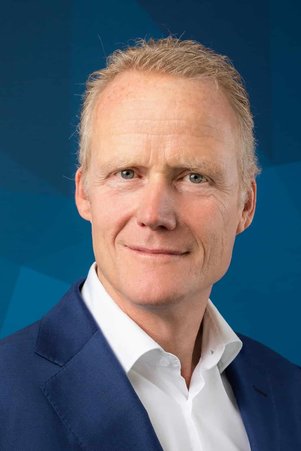Lucas van Vliet, dean
As of January 1st 2021, the Executive Board has appointed Professor Lucas van Vliet to the position of Dean of the Faculty of Electrical Engineering, Mathematics and Computer Science (EEMCS). He succeeds Professor John Schmitz, who is retiring on 1 March 2021.
Lucas van Vliet studied Applied Physics at TU Delft and was awarded his doctorate cum laude in 1993, specialising in the development of image analysis methods. He subsequently joined what was then the Faculty of Applied Physics at TU Delft. He has conducted pioneering research in his field and has co-authored more than 200 academic publications and supervised over 60 doctoral candidates. In 1999, he was appointed full professor and Antoni van Leeuwenhoek Professor. Van Vliet was Director of the Imaging Physics Department from 2009 through 2016. As a Medical Delta Professor he has combined his position in Delft with his role as Professor of Multidimensional Image Analysis at Leiden University since 2012. He also initiated and chaired the TU Delft Health Initiative from its establishment in 2009 until March 2017. He was Dean of the Faculty of Applied Sciences from 2016 through 2020. Van Vliet holds several ancillary positions, including on the supervisory boards of Holland PTC, BPF and Planet B.io. In 2019 he was appointed an Officer in the Order of Orange-Nassau.
The Executive Board is delighted with Van Vliet's appointment. ‘The EEMCS disciplines lie at the core of the technology we use on a daily basis and play a major role in the quest for solutions to the great challenges of the age. In recent years, EEMCS has developed into a faculty that is not only highly attractive to students – its excellent cooperation with business and industry helps ensure that new technology can benefit society more quickly by means of applied research. We are convinced that Lucas van Vliet will be a worthy successor to John Schmitz. He will be able to continue to develop the faculty and weather the challenges placed on it by the current crisis and its expected aftermath.’
Van Vliet is enthusiastic about his move to EEMCS. ‘I will find at EEMCS a highly stimulating environment with fantastic colleagues. We have a shared ambition to generate both a scientific and social impact through outstanding teaching and groundbreaking research. My own teaching and research have always had a strong EEMCS signature. With its teaching and research, EEMCS is at the forefront of major changes. The key technologies on which EEMCS is working will prove essential in tackling the major social challenges in the fields of health, digital society and a sustainable energy supply. EEMCS is also at the forefront of educational innovation. It fills me with pride to have the honour to join EEMCS colleagues in contributing to all of this.’
